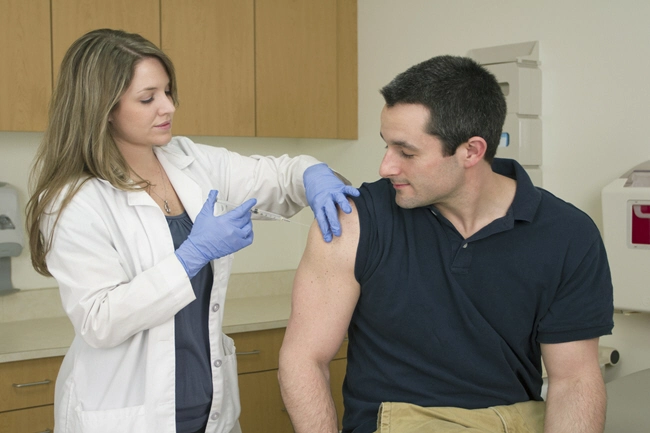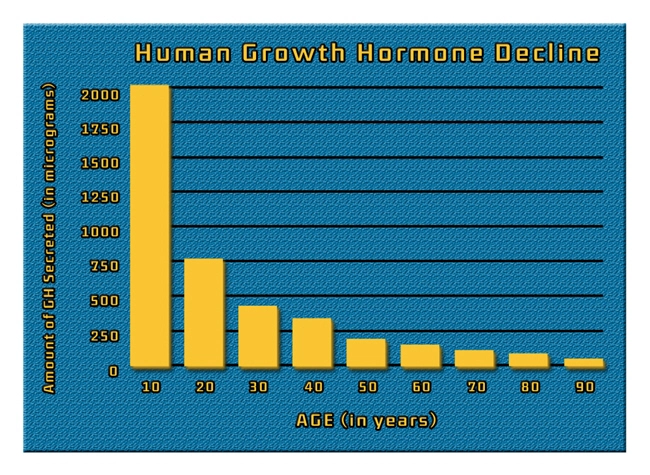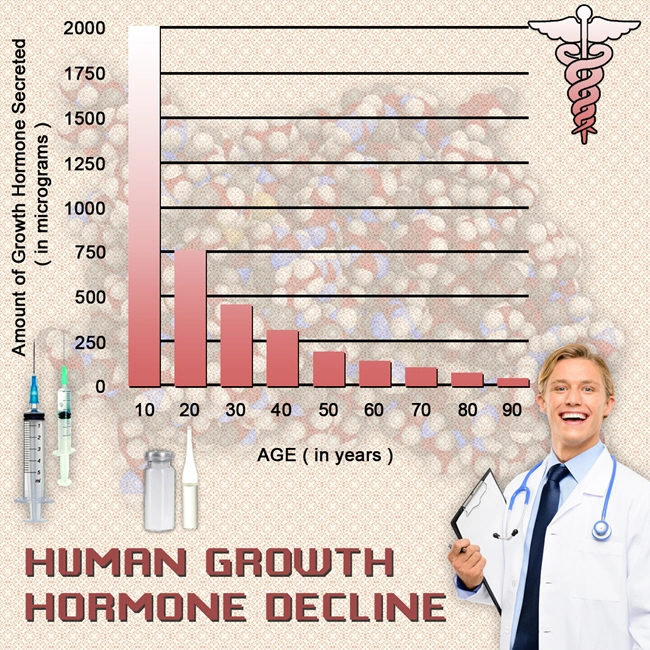
Introduction
Human Growth Hormone (HGH) plays a pivotal role in growth, metabolism, and overall health. Recent research has begun to uncover a concerning correlation between obesity and HGH levels, particularly in American males. This article delves into the impact of obesity on HGH, offering insights crucial for understanding and addressing this health concern.
The Physiology of HGH
HGH, secreted by the pituitary gland, is essential for cell repair, muscle growth, and maintaining healthy body composition. Its levels naturally fluctuate throughout the day, peaking during sleep. In healthy individuals, HGH supports the body's metabolic processes, aiding in fat utilization and muscle development.
Obesity and HGH: A Complex Relationship
Obesity, a growing epidemic in the United States, has been shown to inversely affect HGH levels. Studies indicate that individuals with higher body fat percentages tend to have lower HGH secretion. This relationship is particularly pronounced in American males, where lifestyle factors such as diet and physical activity play significant roles.
Mechanisms Behind the Decline
The mechanisms linking obesity to reduced HGH levels are multifaceted. Excess body fat can lead to insulin resistance, which in turn can suppress HGH secretion. Additionally, adipose tissue produces hormones like leptin, which can alter the feedback mechanisms regulating HGH release. This creates a vicious cycle where decreased HGH levels contribute to further weight gain, exacerbating the issue.
Health Implications for American Males
For American males, the implications of reduced HGH due to obesity are significant. Lower HGH levels can lead to increased fat accumulation, reduced muscle mass, and a higher risk of metabolic syndrome. These factors not only affect physical appearance but also increase the risk of cardiovascular diseases and diabetes, which are already prevalent among American men.
Addressing the Issue: Strategies for Improvement
To combat the negative effects of obesity on HGH levels, American males can adopt several strategies. Regular physical activity, particularly resistance training, has been shown to boost HGH secretion. Additionally, a balanced diet that promotes weight loss can help restore HGH levels. Intermittent fasting, which has gained popularity, may also enhance HGH production by improving insulin sensitivity.
The Role of Medical Intervention
In some cases, medical intervention may be necessary. For individuals struggling with significant obesity, healthcare providers might consider HGH therapy as part of a comprehensive treatment plan. However, this should be approached cautiously, as long-term use of HGH can have side effects and should be monitored closely.
Conclusion
The relationship between obesity and HGH levels in American males is a critical health concern that warrants attention. By understanding the mechanisms behind this link and adopting lifestyle changes, men can improve their HGH levels and overall health. As research continues to evolve, it is essential for American males to stay informed and proactive in managing their weight and HGH levels to lead healthier lives.
Contact Us Today For A Free Consultation
Dear Patient,
Once you have completing the above contact form, for security purposes and confirmation, please confirm your information by calling us.
Please call now: 1-800-380-5339.
Welcoming You To Our Clinic, Professor Tom Henderson.

- Maximizing Your Potential: Dietary Strategies to Enhance Human Growth Hormone in American Males [Last Updated On: February 24th, 2025] [Originally Added On: February 24th, 2025]
- Decoding the Biochemical Enigma: Unveiling the Intricacies of Human Growth Hormones [Last Updated On: February 25th, 2025] [Originally Added On: February 25th, 2025]
- The Powerhouse of Biological Growth: Unlocking the Discernments of Human Growth Hormone [Last Updated On: February 26th, 2025] [Originally Added On: February 26th, 2025]
- Unraveling the Riddle of Longevity: A Deep Dive into the Anti-Aging Potential of HGH [Last Updated On: February 27th, 2025] [Originally Added On: February 27th, 2025]
- Unveiling the Marvel of Human Biology: The Intricate Role of Human Growth Hormone [Last Updated On: February 28th, 2025] [Originally Added On: February 28th, 2025]
- Embarking on the Path to Comprehension: Everything You Need to Know about Human Growth Hormone [Last Updated On: February 28th, 2025] [Originally Added On: February 28th, 2025]
- Delving Deep: Unraveling the Human Growth Hormone Enigma [Last Updated On: March 1st, 2025] [Originally Added On: March 1st, 2025]
- Orchestration in The Body: Harmonizing Roles of HGH with Other Hormones [Last Updated On: March 2nd, 2025] [Originally Added On: March 2nd, 2025]
- Exploring the Multifaceted Impact of Human Growth Hormone on Organ Health: From Cardiovascular to Cognitive Functions [Last Updated On: March 3rd, 2025] [Originally Added On: March 3rd, 2025]
- Expanding Horizons in Growth Hormone Therapy Applications [Last Updated On: March 4th, 2025] [Originally Added On: March 4th, 2025]
- Understanding Human Growth Hormone: Natural vs. Synthetic Approaches [Last Updated On: March 5th, 2025] [Originally Added On: March 5th, 2025]
- Exploring Human Growth Hormone: Benefits for Muscle, Bone, and Skin Health in Men [Last Updated On: March 6th, 2025] [Originally Added On: March 6th, 2025]
- Optimizing Human Growth Hormone for Enhanced Fitness Performance in American Males [Last Updated On: March 7th, 2025] [Originally Added On: March 7th, 2025]
- Comprehensive Guide to HGH Deficiency: Symptoms, Diagnosis, Treatment, and Future Directions [Last Updated On: March 8th, 2025] [Originally Added On: March 8th, 2025]
- The Vital Role of HGH in Men's Health: Muscle, Fat, and Energy Metabolism [Last Updated On: March 9th, 2025] [Originally Added On: March 9th, 2025]
- Optimizing HGH Production: The Crucial Role of Sleep Quality in American Males [Last Updated On: March 10th, 2025] [Originally Added On: March 10th, 2025]
- HGH's Impact on Athletic Performance: Benefits, Risks, and Natural Enhancement for American Males [Last Updated On: March 12th, 2025] [Originally Added On: March 12th, 2025]
- Unlocking the Secrets of Youth: The Advancements in HGH Therapy for Anti-Aging [Last Updated On: March 13th, 2025] [Originally Added On: March 13th, 2025]
- Unlocking the Power of HGH: Lifestyle Strategies for American Males to Boost Natural Growth Hormone Levels [Last Updated On: March 15th, 2025] [Originally Added On: March 15th, 2025]
- Unleashing the Power of Exercise: How Workouts Boost Human Growth Hormone in American Males [Last Updated On: March 16th, 2025] [Originally Added On: March 16th, 2025]
- Legal and Ethical Challenges of Human Growth Hormone Use in Sports and Medicine [Last Updated On: March 17th, 2025] [Originally Added On: March 17th, 2025]
- Stress, Cortisol, and HGH: Optimizing Health for American Males [Last Updated On: March 18th, 2025] [Originally Added On: March 18th, 2025]
- Human Growth Hormone: Risks, Misuse, and Ethical Concerns in Fitness and Sports [Last Updated On: March 18th, 2025] [Originally Added On: March 18th, 2025]
- HGH's Cellular Impact on American Males: Growth, Muscle, and Health [Last Updated On: March 18th, 2025] [Originally Added On: March 18th, 2025]
- HGH Market Trends, Costs, and Impacts on American Males [Last Updated On: March 19th, 2025] [Originally Added On: March 19th, 2025]
- HGH Therapy in Aging Males: Benefits, Risks, and Ethical Considerations [Last Updated On: March 19th, 2025] [Originally Added On: March 19th, 2025]
- HGH's Potential Cardiovascular Benefits for American Males: A Comprehensive Overview [Last Updated On: March 19th, 2025] [Originally Added On: March 19th, 2025]
- HGH Therapy: Enhancing Growth and Health in Children with Disorders [Last Updated On: March 19th, 2025] [Originally Added On: March 19th, 2025]
- HGH's Impact on Immune Health in American Males: Strategies and Considerations [Last Updated On: March 21st, 2025] [Originally Added On: March 21st, 2025]
- HGH Decline in Aging American Males: Impacts and Mitigation Strategies [Last Updated On: March 21st, 2025] [Originally Added On: March 21st, 2025]
- Human Growth Hormone: From Discovery to Clinical Applications and Future Prospects [Last Updated On: March 21st, 2025] [Originally Added On: March 21st, 2025]
- HGH's Role in Bone Health for American Males: Growth, Density, and Healing [Last Updated On: March 21st, 2025] [Originally Added On: March 21st, 2025]
- HGH Benefits for American Males: Muscle Gain and Fat Loss Optimization [Last Updated On: March 22nd, 2025] [Originally Added On: March 22nd, 2025]
- Environmental Factors Impacting HGH Production in American Males: Sleep, Diet, Exercise, Toxins, Stress, Age [Last Updated On: March 22nd, 2025] [Originally Added On: March 22nd, 2025]
- Innovative HGH Delivery Systems: Enhancing Health in American Males [Last Updated On: March 22nd, 2025] [Originally Added On: March 22nd, 2025]
- Recombinant HGH: Benefits, Applications, and Safety for American Males [Last Updated On: March 22nd, 2025] [Originally Added On: March 22nd, 2025]
- HGH's Comprehensive Impact on Organ Systems in American Males [Last Updated On: March 23rd, 2025] [Originally Added On: March 23rd, 2025]
- HGH's Impact on Recovery and Performance in American Males [Last Updated On: March 23rd, 2025] [Originally Added On: March 23rd, 2025]
- HGH Therapy Advances: Benefits, Research, and Safety for American Males [Last Updated On: March 24th, 2025] [Originally Added On: March 24th, 2025]
- HGH's Daily Impact on Energy and Performance in American Males [Last Updated On: March 24th, 2025] [Originally Added On: March 24th, 2025]
- HGH's Role in Preventing Osteoporosis in American Males: Current Insights and Future Directions [Last Updated On: March 24th, 2025] [Originally Added On: March 24th, 2025]
- Managing HGH Deficiency in American Males: Treatments and Lifestyle Interventions [Last Updated On: March 24th, 2025] [Originally Added On: March 24th, 2025]
- Debunking HGH Myths: Risks, Benefits, and Realistic Expectations for American Males [Last Updated On: March 24th, 2025] [Originally Added On: March 24th, 2025]
- High-Intensity Workouts Boost HGH for Muscle Growth and Fat Loss in Males [Last Updated On: March 24th, 2025] [Originally Added On: March 24th, 2025]
- HGH and IGF-1: Enhancing Male Health, Muscle Growth, and Longevity [Last Updated On: March 24th, 2025] [Originally Added On: March 24th, 2025]
- HGH in Sports: Ethical Dilemmas and Health Risks for American Male Athletes [Last Updated On: March 25th, 2025] [Originally Added On: March 25th, 2025]
- HGH and Longevity: Benefits, Risks, and Lifestyle Impact for American Males [Last Updated On: March 25th, 2025] [Originally Added On: March 25th, 2025]
- HGH's Impact on Cognitive Function in American Males: Growth, Benefits, and Future Research [Last Updated On: March 25th, 2025] [Originally Added On: March 25th, 2025]
- Human Growth Hormone: Benefits, Risks, and Aging Gracefully in Men [Last Updated On: March 25th, 2025] [Originally Added On: March 25th, 2025]
- Human Growth Hormone: Impacts on Growth, Metabolism, and Aging in American Males [Last Updated On: March 26th, 2025] [Originally Added On: March 26th, 2025]
- HGH in Regenerative Medicine: Enhancing Vitality and Health in American Males [Last Updated On: March 26th, 2025] [Originally Added On: March 26th, 2025]
- HGH's Role in Growth, Aging, and Health for American Males: Insights and Implications [Last Updated On: March 26th, 2025] [Originally Added On: March 26th, 2025]
- HGH Synergy with Testosterone, Supplements, Exercise, and Sleep for American Males' Health [Last Updated On: March 26th, 2025] [Originally Added On: March 26th, 2025]
- Hormonal Optimization: Enhancing HGH for Peak Performance and Vitality in Men [Last Updated On: March 26th, 2025] [Originally Added On: March 26th, 2025]
- HGH Benefits for American Males in Accelerating Wound Healing and Recovery [Last Updated On: March 26th, 2025] [Originally Added On: March 26th, 2025]
- HGH Therapy: Enhancing Health in American Males Through Holistic Integration [Last Updated On: March 26th, 2025] [Originally Added On: March 26th, 2025]
- Intermittent Fasting Boosts HGH: Benefits for American Males' Health and Fitness [Last Updated On: March 26th, 2025] [Originally Added On: March 26th, 2025]
- HGH Therapy: Enhancing Quality of Life for American Males with Chronic Illnesses [Last Updated On: March 27th, 2025] [Originally Added On: March 27th, 2025]
- HGH's Role in Enhancing Post-Surgical Recovery for American Males [Last Updated On: March 27th, 2025] [Originally Added On: March 27th, 2025]
- Acromegaly in American Males: Diagnosis, Impact, and Management Strategies [Last Updated On: March 27th, 2025] [Originally Added On: March 27th, 2025]
- HGH's Impact on Skin Health: Collagen, Elastin, and Hydration for American Males [Last Updated On: March 27th, 2025] [Originally Added On: March 27th, 2025]
- HGH in Women: Benefits, Challenges, and Insights for American Men [Last Updated On: March 27th, 2025] [Originally Added On: March 27th, 2025]
- HGH Therapy Success in American Men: Case Studies on Health and Performance [Last Updated On: March 27th, 2025] [Originally Added On: March 27th, 2025]
- HGH Supplements: Efficacy, Safety, and Natural Alternatives for American Males [Last Updated On: March 28th, 2025] [Originally Added On: March 28th, 2025]
- Genetic and Familial Influences on HGH Production in American Males [Last Updated On: March 28th, 2025] [Originally Added On: March 28th, 2025]
- Maximizing HGH Release: Sleep Strategies for American Males' Health Optimization [Last Updated On: March 28th, 2025] [Originally Added On: March 28th, 2025]
- HGH's Role in Cognitive Enhancement: Benefits and Considerations for American Males [Last Updated On: March 29th, 2025] [Originally Added On: March 29th, 2025]
- HGH Benefits for Muscle Recovery and Athletic Performance in American Males [Last Updated On: March 29th, 2025] [Originally Added On: March 29th, 2025]
- HGH Testing for American Males: Types, Procedures, and Importance [Last Updated On: March 30th, 2025] [Originally Added On: March 30th, 2025]
- HGH Innovations: Enhancing Health and Performance in American Males [Last Updated On: March 31st, 2025] [Originally Added On: March 31st, 2025]
- Mindfulness and Meditation Boost HGH Levels in American Men by Reducing Stress [Last Updated On: April 1st, 2025] [Originally Added On: April 1st, 2025]
- Optimizing HGH Levels: Diet, Exercise, Sleep, and Stress Management for American Men [Last Updated On: April 3rd, 2025] [Originally Added On: April 3rd, 2025]
- HGH's Impact on Cardiovascular Health in American Males: Benefits and Risks [Last Updated On: April 3rd, 2025] [Originally Added On: April 3rd, 2025]
- HGH in Sports: Ethical Dilemmas, Health Risks, and the American Male Athlete [Last Updated On: April 5th, 2025] [Originally Added On: April 5th, 2025]
- HGH's Impact on Liver Function in American Males: Growth, Detoxification, and Therapy [Last Updated On: April 6th, 2025] [Originally Added On: April 6th, 2025]
- HGH's Role in Tissue Renewal and Health for American Males [Last Updated On: April 6th, 2025] [Originally Added On: April 6th, 2025]
- HGH Therapy: Benefits, Side Effects, and Long-Term Risks for American Males [Last Updated On: April 7th, 2025] [Originally Added On: April 7th, 2025]
- HGH Therapy for American Males: Balancing Costs and Health Benefits [Last Updated On: April 8th, 2025] [Originally Added On: April 8th, 2025]
- HGH's Role in Enhancing Immune Function in American Males [Last Updated On: April 8th, 2025] [Originally Added On: April 8th, 2025]
- HGH Therapy for American Males: Benefits, Risks, and Lifestyle Considerations [Last Updated On: April 9th, 2025] [Originally Added On: April 9th, 2025]









